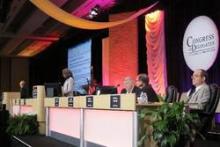WASHINGTON– Medicare Part B should pay physicians to administer vaccines in their offices, according to resolutions passed at the annual Congress of Delegates of the American Academy of Family Physicians.
The AAFP’s policymaking body voted to advocate that the Centers for Medicare & Medicaid Services pay physicians under Medicare Part B to administer the shingles vaccine and all other vaccines recommended by the Advisory Committee on Immunization Practices. Payment should be retroactive to when the ACIP first recommends a particular vaccine, according to a resolution introduced by the New York State chapter.
The Mississippi delegation urged the delegates to approve a resolution to have Medicare pay for the cost of insulin pens, as many patients with diabetes and vision issues cannot appropriately use vials and syringes, which are covered by Medicare. The AAFP Congress backed this resolution, also.
A hotly contested resolution called for the AAFP to advocate for a ban on diagnostic testing by pharmacists. An initiative in Michigan is allowing pharmacists to test for conditions like strep and then prescribe appropriate medications. The Michigan chapter urged the Congress to take a strong stand against this expansion of scope-of-practice for pharmacists, saying that it would likely spread to other states.
Many delegates said that pharmacists did not have extensive clinical training and that patient safety could be jeopardized. Others said that they did not want to be viewed as engaging in a turf battle against pharmacists.
Ultimately, the Congress referred the proposal to the AAFP board for study.
The Congress also voted against advocating for a single-payer health care system, and referred to the AAFP board a proposal to rescind the marketing approval of the long-acting opioid Zohydro.
The New York and Rhode Island chapters asked the AAFP to lobby the U.S. Congress to pass a law to treat electronic cigarettes the same as tobacco products, and that the minimum age for purchase be made the same as well. That resolution was accepted by the delegates.
The AAFP Congress also adopted a resolution that urged the federal government to end the mandatory 30-day waiting period between when informed consent is given and when Medicaid will cover a voluntary sterilization procedure. Delegates also backed a proposal to urge coverage of vasectomy and male contraceptive services as a preventive care service – that is, a cost-free service – under the Affordable Care Act.
On Twitter @aliciaault


